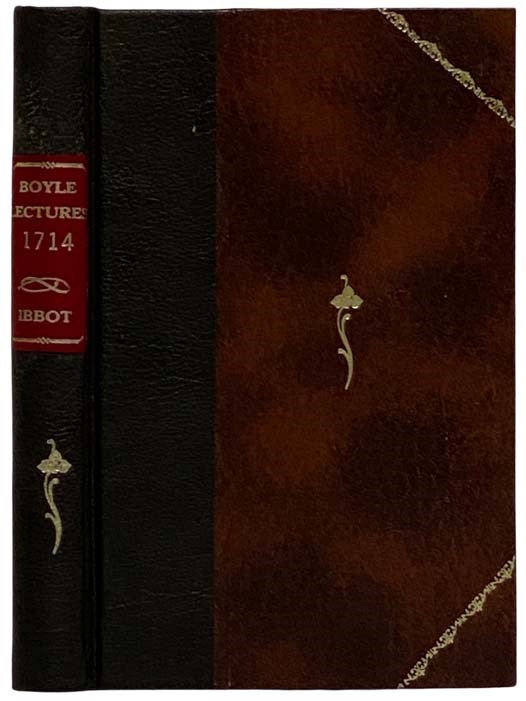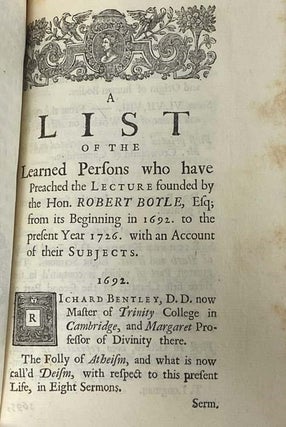A Course of Sermons Preach'd in the Year 1714. at the Lecture Founded by the Honourable Robert Boyle Esq; by the Late Reverend Benjamin Ibbot D.D.
London: Printed for John Wyat, at the Rose of St. Paul's Church-Yard. 1727. Hard Cover. Very Good / No Jacket. Item #2325578
ESTC T55132. Rebound somewhat recently with new end sheets: dark brown leather spine with leather label over hardcover boards with gilt titles and decorations. Lightly foxed throughout, owner blind stamp on new end sheet.
264 pp. 8vo. Includes eight sermons and a list of people who preached the Boyle Lecture 1696-1726. The apparent purpose of these lectures was to reconcile the principle of free will with the ideal of religious faith and obedience to God. Sermons include: Of the Cautions Necessary to Be Observ'd in the Use of Private Judgment, or Freethinking.; The Objections against Private Judgment Answer'd.; The Benefits and Advantages of Private Judgment.; Concerning the Authority of the Antients.; Objections Out of Scripture, against Free-Thinking, Answer'd.; More Objections Out of Scripture, against Free-Thinking, Answer'd.; That the Scriptures Do Suppose, Encourage, and Enjoin the Use of Our Reason in Matters of Religion.; The Mischiefs and Dangers which Men Expose Themselves to, by Indulging That Humour which They Falsly Call Freethinking. Robert Boyle was a natural philosopher. His father, known as the Great Earl, was one of the self-made men of the seventeenth century; having arrived in Ireland in 1588 with virtually no money, he lived to be one of the wealthiest subjects in the kingdom. Robert studied at Eton and Oxford, distinguishing himself in his writings on the sciences and other topics. Of particular note was his public clash with Thomas Hobbes. The controversy with Hobbes has proved of much interest to historians, partly because it involved an attack on the newly established Royal Society combined with an attack on Boyle's methods of investigation. Boyle explicitly recognized this feature of Hobbes's approach: 'though some things in the Title Page [and] in the Book it self seem to make the chief Design of it to be the Disparagement of the Society', he wrote, 'yet the Arguments are for the most part levelled at some Writings of mine', and he expressed his surprise that an experienced writer would publicly attack an institution supported by his own patron, the duke of Devonshire. For his part, in An Examen of Mr T. Hobbes's 'Dialogus' (1662), Boyle used the opportunity to strengthen the grounds for experimental knowledge by contrasting it with Hobbes's method of arguing from plausible hypotheses, declaring that 'on the occasion of Mr Hobbs's Building a great part of his philosophy upon no surer a ground … we may hence learn how little Reason there is to blame me, as he is pleas'd to do, for making Elaborate Experiments' (Works, 3.115, 120). One of the numerous codicils to Boyle's will provided for the setting up of a series of lectures for the defence of the Christian religion against atheists and others, the so-called Boyle lectures. The first series of these was delivered by the scholar and divine Richard Bentley in 1692. Other charitable bequests under Boyle's will followed later in the 1690s and into the early eighteenth century." - Oxford Dictionary of National Biography
Price: $175.00


